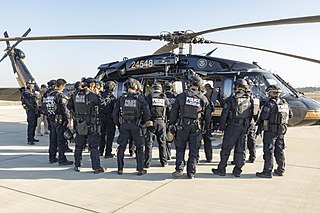
In the United States, a SWAT team is a generic term for a police tactical unit that uses specialized or military equipment and tactics.

The Los Angeles Police Department (LAPD), officially known as the City of Los Angeles Police Department, is the primary law enforcement agency of Los Angeles, California, United States. With 8,967 officers and 3,000 civilian staff, it is the third-largest municipal police department in the United States, after the New York City Police Department and the Chicago Police Department.
Police Quest is a series of police simulation video games produced and published by Sierra On-Line between 1987 and 1998. The first five were adventure simulation games, the first three of which were designed by former police officer Jim Walls. The fourth to sixth titles were designed by former LAPD Chief Daryl F. Gates. Both SWAT and the real-time tactics game SWAT 2 still carried the Police Quest name and were numbered V and VI in the series, respectively, although subsequent titles in the series would drop the Police Quest title altogether and were rebranded as SWAT.

S.W.A.T. is a 2003 American action crime thriller film directed by Clark Johnson and written by David Ayer and David McKenna, with the story credited to Ron Mita and Jim McClain. Produced by Neal H. Moritz, it is based on the 1975 television series of the same name and stars Samuel L. Jackson, Colin Farrell, Michelle Rodriguez, LL Cool J, Josh Charles, Jeremy Renner, Brian Van Holt and Olivier Martinez. The plot follows Hondo (Jackson) and his SWAT team as they are tasked to escort an imprisoned drug kingpin/international fugitive to prison after he offers a $100 million reward to anyone who can break him out of police custody.

Daryl Francis Gates was an American police officer who served as chief of the Los Angeles Police Department from 1978 to 1992. His length of tenure in this position was second only to that of William H. Parker. Gates is credited with the creation of SWAT teams alongside fellow Los Angeles Police Department (LAPD) officer John Nelson, who others claim was the originator of SWAT in 1965. Gates also co-founded the Drug Abuse Resistance Education program.

SWAT 3: Close Quarters Battle is a 1999 tactical first-person shooter video game developed by Sierra Northwest and published by Sierra Entertainment exclusively for Microsoft Windows. It is the seventh installment of the Police Quest series and the third installment in the SWAT subseries. SWAT 3 follows the Los Angeles Police Department (LAPD) Metropolitan Division SWAT team as they combat a wave of violent crime and terrorism in Los Angeles in the lead-up to a nuclear disarmament treaty signing.

Jim Walls is an American video game designer. He is notable for having designed the successful Police Quest series of adventure games for Sierra On-Line.

Die Hard: Vendetta is a 2002 first-person shooter video game developed by Bits Studios. The game was published by Fox Interactive, alongside Vivendi Universal Games International in Europe under their NDA Productions subsidiary, and Sierra Entertainment/Vivendi Universal Games in North America. Taking place after the first three Die Hard films, players take on terrorists as John McClane. Reginald VelJohnson reprises his role as Sgt. Al Powell. McClane's daughter, Lucy, is an L.A.P.D. member in the game.

The Rampart Division of the Los Angeles Police Department (LAPD) serves communities to the west of Downtown Los Angeles (DTLA) including Silver Lake, Echo Park, Pico-Union and Westlake, all together designated as the Rampart patrol area. Its name is derived from Rampart Boulevard, one of the principal thoroughfares in its patrol area. The original station opened in 1966, located at 2710 West Temple Street. In 2008, the staff moved southeast to a newer facility located at 1401 West 6th Street. With 164,961 residents occupying a 5.4-square-mile (14 km2) area, Rampart is one of Los Angeles's most densely populated communities.

Police Quest: SWAT 2 (stylized as SWAT2) is a 1998 real-time tactics video game developed by Yosemite Entertainment and published by Sierra FX (both studios of Sierra On-Line) exclusively for Microsoft Windows. It is the sixth installment in the Police Quest series and the second installment in the SWAT subseries. The game follows the Los Angeles Police Department (LAPD) Metropolitan Division SWAT team as they clash with a domestic terrorist militia launching attacks across Los Angeles.

44 Minutes: The North Hollywood Shoot-Out is a 2003 American crime action mockumentary television film directed by Yves Simoneau and written by Tim Metcalfe. The film stars Michael Madsen, Ron Livingston, Mario Van Peebles, Andrew Bryniarski, and Oleg Taktarov. It is a semi-fictional dramatization of the 1997 North Hollywood shootout, and follows the perspectives of bank robbers Larry Eugene Phillips Jr. and Emil Mătăsăreanu, as well as various Los Angeles Police Department (LAPD) officers involved in the shootout.

The Los Angeles Police Department (LAPD) was formed in 1869, and has since become the third-largest law enforcement agency in the United States. They have been involved in various events in history, such as the Black Dahlia murder, the Watts riots, the 1992 Los Angeles riots, the North Hollywood shootout, the murder trial of O. J. Simpson, and the Rampart scandal.

Police Quest II: The Vengeance is a 1988 police procedural adventure video game developed and published by Jim Walls and Sierra On-Line. It is the second installment in the Police Quest series. The game continues the story of police officer Sonny Bonds as he attempts to apprehend an escaped convict.

Police Quest: In Pursuit of the Death Angel is a 1987 police procedural adventure video game developed and published by Jim Walls and Sierra On-Line. Police Quest follows police officer Sonny Bonds as he investigates a drug cartel in the town of Lytton, California.

Police Quest III: The Kindred is a 1991 police procedural point-and-click adventure video game developed and published by Jim Walls and Sierra On-Line. It is the third installment in the Police Quest series. The game finishes the story of police officer Sonny Bonds, who seeks revenge after his wife is attacked by an unknown assailant.

Metropolitan Division, commonly referred to as Metro Division or just Metro, is an elite division of the Los Angeles Police Department (LAPD) under its Special Operations Group. Metropolitan Division is responsible for managing the LAPD's specialized crime suppression, K-9, mounted, and SWAT units, named "platoons".

Police Quest: SWAT, alternatively known as Daryl F. Gates' Police Quest: SWAT or Police Quest 5: SWAT, is a 1995 graphic adventure educational video game developed and published by Sierra On-Line for DOS, Microsoft Windows, and Mac OS. It is the fifth installment in the Police Quest series and the first installment in the SWAT subseries. The game follows a Los Angeles Police Department (LAPD) Metropolitan Division SWAT team as they train to handle high-risk criminal incidents across Los Angeles.

Bosch is an American police procedural streaming television series produced by Amazon Studios and Fabrik Entertainment starring Titus Welliver as Los Angeles Police Department detective Harry Bosch. The show was developed for Amazon by Eric Overmyer, and the first season takes its inspiration from the Michael Connelly novels City of Bones (2002), Echo Park (2006), and The Concrete Blonde (1994). It was one of two drama pilots that Amazon streamed online in early 2014, and viewers offered their opinions on it before the studio decided whether to place a series order. The seventh and final season was released on June 25, 2021.
S.W.A.T. is an American procedural action drama television series, based on the 1975 television series and 2003 film of the same name. Aaron Rahsaan Thomas and Shawn Ryan developed the new series, which premiered on CBS on November 2, 2017, and is produced by Original Film, CBS Studios and Sony Pictures Television. In April 2022, the series was renewed for a sixth season which premiered on October 7, 2022. In May 2023, the series was canceled after six seasons at CBS, only to be renewed for a seventh and final season at CBS a few days later. The seventh and final season is scheduled to premiere on February 16, 2024.

















